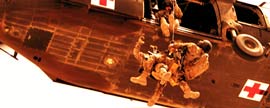There is no specific regulation that covers phone courtesy. However when talking on the phone all other military customs and courtesies that would otherwise be extended to a leader in person apply when speaking on the phone. Let’s look at a couple of examples:
Military Phone: When answering a military phone usually the unit has an SOP, policy letter, or the instructions are provided in a verbal briefing to the Soldier who will answer the phone. Typically it goes something like this:
Charlie Battery 1st of the 35th Field Artillery, SPC Jones speaking, this line is not secure. How can I assist you?
Civilian Phone: When answering a personal phone the Soldier should answer in a manner that is considered reasonably acceptable for answering a phone. Once the individual on the line identifies themselves as a member of the military the Soldier is bound to apply all military customs and courtesies appropriate and should speak as if the conversation was taking place in person.
Good Example:
Soldier: Hello,
Leader: SPC Jones, this is Sergeant Rock.
Soldier: Yes, Sergeant
Leader: The parts for our track just came into the motor pool and the entire section must report to the motor pool to begin maintenance. You need to be at the motor pool no later than 14oo hours, in duty uniform.
Soldier: Roger, Sergeant
Bad Example:
Soldier: Yeah! What’s up?
Leader: SPC Jones, this is Sergeant Rock.
Soldier: Look Dude why are you bothering me I am off today!
Leader: First, its Sergeant, not Dude.
Soldier: Yeah! Whatever man!
Leader: SPC Jones, The parts for our track just came into the motor pool and the entire section must report to the motor pool to begin maintenance. You need to be at the motor pool no later than 14oo hours, in duty uniform. In addition you will refer to me as Sergeant Rock, not by any other title or name. Your comments are disrespectful and unprofessional.
NOTE: Notice the Leader did not allow the Soldier’s comments to distract them. Instead the Leader ensure the Soldier was told exactly what was expected of them. Then and only then did the Leader address the substandard performance. The reason for this was to make sure an agreement did not start of the issue of rank. It allowed the leader to get the information to the Soldier quickly so the conversation could not be side tracked.
Soldier: Yeah, well I am off duty and you got no right bothering me on my time off. I got rights you know. So I hate to disappoint you but I won’t be at the motor pool, I have plans. So I will catch you later big SARGE!
Leader: SPC Jones, unfortunately you do not have a choice. You will be in the motor pool at 1400 hours in duty uniform. Failure to obey this order will result in possible action under the UCMJ and other administrative actions. After we have completed the maintenance on our vehicle I will discuss with you your inappropriate, disrespectful and unprofessional conduct during today’s phone conversation. I will see you at 1400 hours in the duty uniform, at the unit motor pool. Do you clearly understand these instructions.
Soldier: Yeah but don’t hold your breath for me showing up. Like I said I got plans and you and the Army ain’t got no part in my plans.
Leader: SPC Jones, you have acknowledged understanding the order and the requirements of the order. I expect to see you in the motor pools as directed. Have a good day!
Notice how the Leader handled the issue in a professional manner. Instead of allowing the conversation to get side tracked the Leader stayed on message because they already made the correction to the Soldier concerning inappropriate/disrespectful behavior and the Soldier failed to respond. So rather than getting into an argument the Leader remained calm and ensured the Soldier understood the requirements and the consequences for failing to obey the order. The Leader prepared the situation in a manner that allows them to address the inappropriate behavior while on the phone at the next face to face meeting.
The Soldier’s actions in the bad example would, in my opinion, qualify as disrespectful and the Soldier would be a prime candidate for corrective training or UCMJ. Once a Leader identifies themselves the Soldier has a duty and obligation to apply all appropriate military customs and courtesies.
Hope this Helps!
Did you find this information useful? I appreciate your feedback!
TOP














